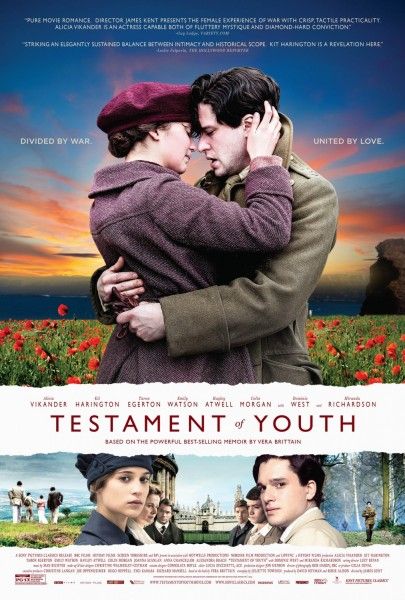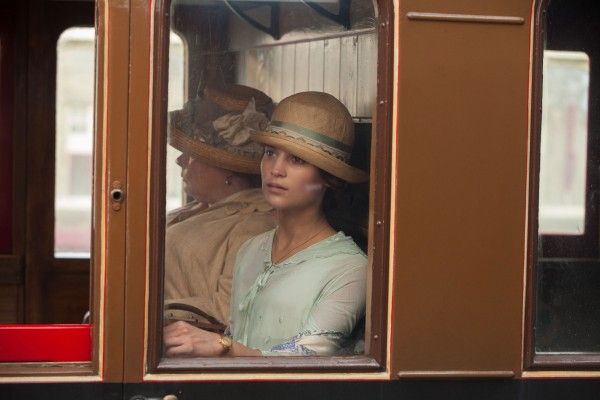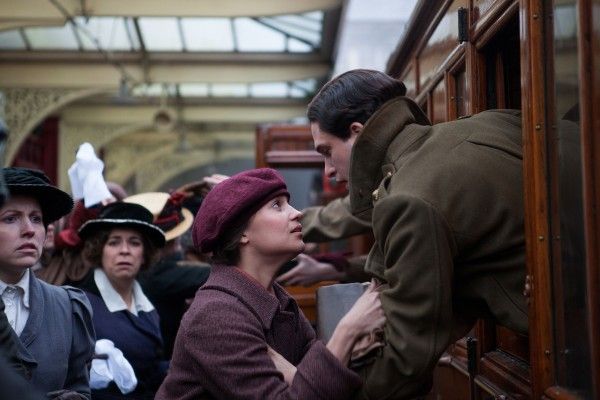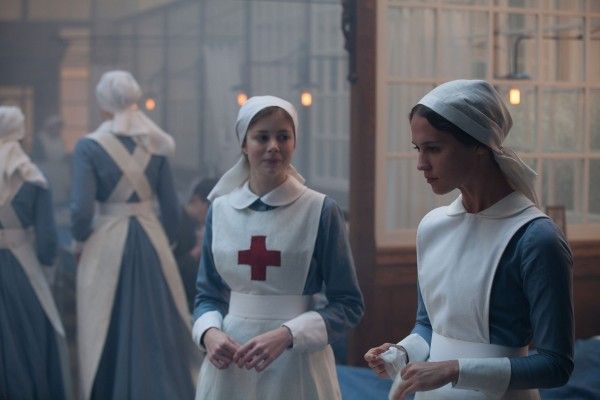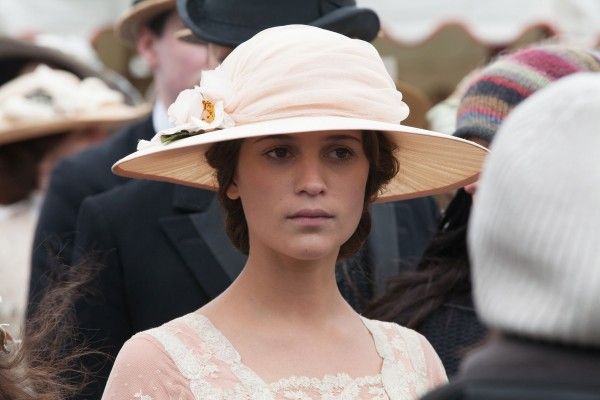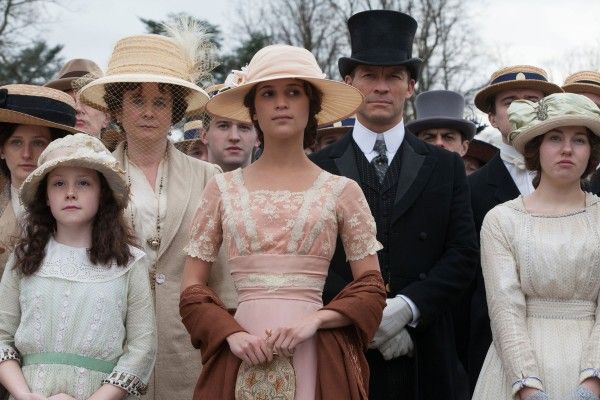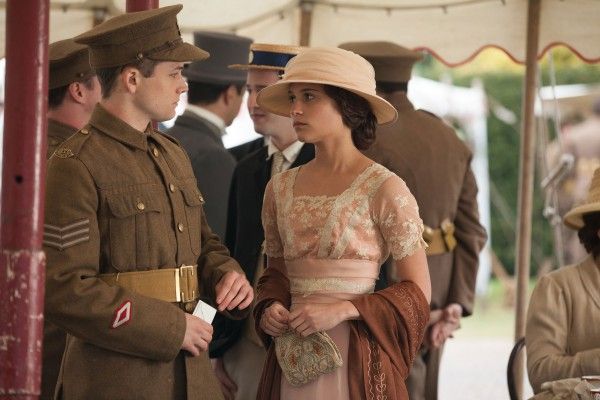In case you haven’t noticed, Alicia Vikander isn’t going anywhere anytime soon. Not only does she deliver one heck of a performance in Ex Machina, but she’s also outstanding in James Kent’s big screen adaptation of Vera Brittain’s WWI memoir, Testament of Youth. Vikander leads as Vera, a young woman who’s determined to study at Oxford even though her parents don’t approve. However, when her brother (Taron Egerton) and lover (Kit Harington) head off to fight in the war, she’s compelled to put her dreams on hold and join the cause herself as a nurse.
It’s really no wonder that Vikander has a bunch of highly anticipated projects like The Man from U.N.C.L.E. and The Danish Girl on the way and that her name is being tossed around for films like Assassin’s Creed and the new Bourne movie. Her career is taking off and she deserves it so it was quite the treat to get the opportunity to talk to her about how things have changed recently and about her experience making Testament of Youth. Check out what she told me about preparing for the role, how she detoxed after shooting the more emotional material and tons more in the interview below. Testament of Youth hits select theaters on June 5th.
COLLIDER: This isn’t a bad place to hang out for the day. I’m a big fan of this hotel.
ALICIA VIKANDER: Yeah, me too. I’ve been having my base in London for almost two years and there’s three hotels from the same chain and they kind of look the same, and it’s the same menu so I had lunch now and I was like, ‘Oh, it feels like I’m kind of in London!’
I know what you mean. I’d totally appreciate that! Have you had a day off in a while?
VIKANDER: [Laughs] I’ve had a couple. Not many, but it’s been a very extraordinary couple of weeks. I’ve done a lot of press for films that have done very well, especially here in the States.
That’s for sure. I’ve seen quite a few of them and they’re all excellent so thank you for making my job such a pleasure!
VIKANDER: Well, thank you for being here.
How has the casting process changed for you recently? Is it any less stressful now that all of these films are coming out?
VIKANDER: You kind of come in and you know how tough this industry is and you’ve had a lot of nos in your face throughout the years because that’s the reality. You kind of always feel like, ‘Will I ever get another part?’ I think that kind of just is inside you, that idea. And then it is strange the first time when you suddenly get options or people that approach you, especially people that you’ve been looking up to or admired on the screen when you grew up and so that’s just wonderful and a bit surreal.
How was it when you auditioned for this in particular? That must have happened before things really started getting crazy for you.
VIKANDER: I thought I was gonna do my casting, and I had so much passion for this. And in one way I knew because it’s such a British icon and I’m foreign and from Sweden, but I met Rosie Alison, the producer, and James Kent, the director, and they kind of offered the part to me and I was just overwhelmed. It means so much that they dared to trust me taking on this part and there was such a great support too, and how they introduced me to Shirley Williams, the daughter of Vera Brittain.
How was it approaching material that’s based on a real person, especially someone who’s told her story to such an extent? Is there any room to make the character your own?
VIKANDER: It is that feeling of you need and you want to stay true to the story, you want to acknowledge the end and praise all the readers of all the books and novels that she’s had, and especially give justice to her family and friends who actually still live and who remember her, who knew her. That was probably the most nerve-wracking thing to meet them in person and do that. But they were so nice and they were really there to support. But then also, with every single character, I think you need to make it your own, and I spoke to Shirley, her daughter, and I think we just together through conversations said that the most important thing is not to do a total copy of what she looked like, that kind of thing. It was kind of, give praise to the emotional journey and the strength that I think that she carried.
How was it shooting this? I imagine you didn’t shoot in order, and she does have a very specific arc, so I can’t quite imagine going back and forth.
VIKANDER: That is always quite tough. It’s very, very rare because of money and time, which you never really have in films in general to shoot anything in order. So it was intense. I did have James there with me all the time, all day, and Rob Hardy, the DOP too, and Rosie Allison. We were working very intensely, very close. To have James who was so kind of determined, he knew exactly what film he wanted to make and he also comes from documentaries, so it was kind of nice when we had such little time to just get into the actual core of the story, a very emotional part. He was always kind of letting us play out our scenes and then he kind of put the camera where he needed just to get whatever we found, which made it very collaborative and very free artistically.
You brought up financing and I read that this wasn’t fully financed before you were cast. Is that something you consider at all when you join a project?
VIKANDER: That is the world of independent cinema. I never really feel like I’m sure a film’s gonna happen until I’m maybe halfway through. [Laughs] It’s tough, but it’s also the wonderful thing. Lots of TV is kind of becoming almost the new form for adult storytelling and cinema, but still with some independent films you still have those kind of jewels that people are able to make and it takes a lot of effort. Rosie has been on this project for I don’t know how many years.
Can you tell me about shooting the material that takes place in France? For the large majority of the movie, you get to wear gorgeous dresses in beautiful places and then, all of a sudden, you’re running around in the dirt and rain.
VIKANDER: Well, you had to do it as gritty and raw as it was because otherwise it doesn’t feel right. You need to get the audience and, for us, to try and give truth to what happened and to how it was. An extraordinary thing that we had there was quite amazing. We had 25, I think, young men, amputees, who had just come back from the war themselves, the last two or three years only. One guy who just came back 14 months before he shot the film from Afghanistan. To have them there wanting to contribute and wanting to tell the story in an accurate way with us was one of the most giving things I’ve ever heard and to kind of have them telling their own personal stories brings such a raw, human emotion to whatever we were doing there. They made it feel very real and they gave it all, and I’m so humble towards the fact that they came and helped us.
How about the deaths that Vera experiences in the movie? They’re important, but you don’t want to repeat the same beat over and over so is there anything you can do to make them each feel unique?
VIKANDER: We discussed that quite early on. In one way, you can’t tell the story without being true to what actually happened. That was how traumatic her reality was, and I think the only thing I could bring into it, first of all, was just for me to realize that every single loss, because for every single person, for every single relationship between two people they’re unique, and whatever relationship you have with someone is gonna be a great loss each time, but it’s a different loss because it’s a different person. But then also dramatically telling a story on a film, you can’t release everything immediately because it would be too much for the audience, so we tried to find new ways. It’s almost like the end of the film. We have a version when you don’t see the actual delivery of a death, but you just hear a scream, and you kind of just through a dream sequence, you kind of know what’s happened. I think we tried to find new ways.
How about the approach to the man she actually marries? I really appreciated how George Catlin pops up briefly, but you don’t need to see them walking off into the sunset together in the end.
VIKANDER: When I read about it, that is not the story. When I see it, I can’t really know if I would survive emotionally going through what she did. And I think she could have either decided just to let it all go for herself or she can decide to kind of rebirth, which she kind of did and decided to find her voice and to write about those people and keep them alive through her words. If you read it and hopefully if you see the film, what they meant to her will never be erased, but also picking yourself up and being the survivor and go through the next steps of life and meeting someone else, it’s also hopefully a part of life.
I walked out of my screening super emotional, but at the same time it is kind of inspiring that she can move on after an experience like this.
VIKANDER: Well, actually in real life it was tough to bring that up. He in words printed out that it was not easy because he lived with a woman who was in love with a ghost because she lost him without really getting to experience that love fully, and she lost him when she was young.
Was there much discussion about appealing specifically to an American audience? I know I have a terrible habit of thinking, ‘Oh, it’s a period piece. They’re gonna wear pretty costumes, hats and wigs. I’m not gonna like it.’ But then I see a movie like this, and there’s something especially grounded and moving about it.
VIKANDER: We wanted to make it the best way for people to feel like they can engage in it. One thing was probably that we wanted to have a younger audience to kind of feel like they are introduced to Vera Brittain’s story in the same way that this film being made was the reason why I heard about the book three years ago and why I picked it up. I’m so grateful for that. But like I said, James has done a great job I think with the DOP, Rob, of making it feel very gritty and very like hand-held camera, and you’re very much in scenes. It’s not supposed to be stylized and it’s also showing what I felt in the book. I don’t think the people have changed so much, and that’s also what I realized reading it. It feels like a girl my age at this time and suddenly I get thrown because she can’t even leave the house without a chaperone. She has the same kind of ideas, beliefs, wants to learn and wants to educate herself and see the world and be politically active and think and yet she can’t even really get an education. She had to do it herself back in that time. So I think when you focus on that, it feels very modern.
It’s also a very emotional story so is there anything you had to do to detox after shooting?
VIKANDER: I was very much in the work when I did it, and we filmed in Yorkshire for seven weeks, six day weeks many of the weeks. I kind of only had an hour when I came back to the hotel before I had to go to sleep, so I detoxed by watching Master Chef at the hotel each night and had my dinner at the same time and then I just read my lines, I went to bed and got up again. [Laughs] I don’t even know! It was not a planned thing. I remember it became a thing because that was like on TV at the exact time when I came back each night.
I know you probably can’t tell me anything about Assassin’s Creed or Bourne, but can you talk about how the casting process for something like that works? From our perspective, you had just joined The Circle, and then all of a sudden those two projects popped up.
VIKANDER: I’m very not used to it. I come from small European cinema and I think more with the big industry here and in Europe, it’s news coming out all the time. And for me, it’s still just in a process where I’m trying to figure out the scheduling and what to do.


